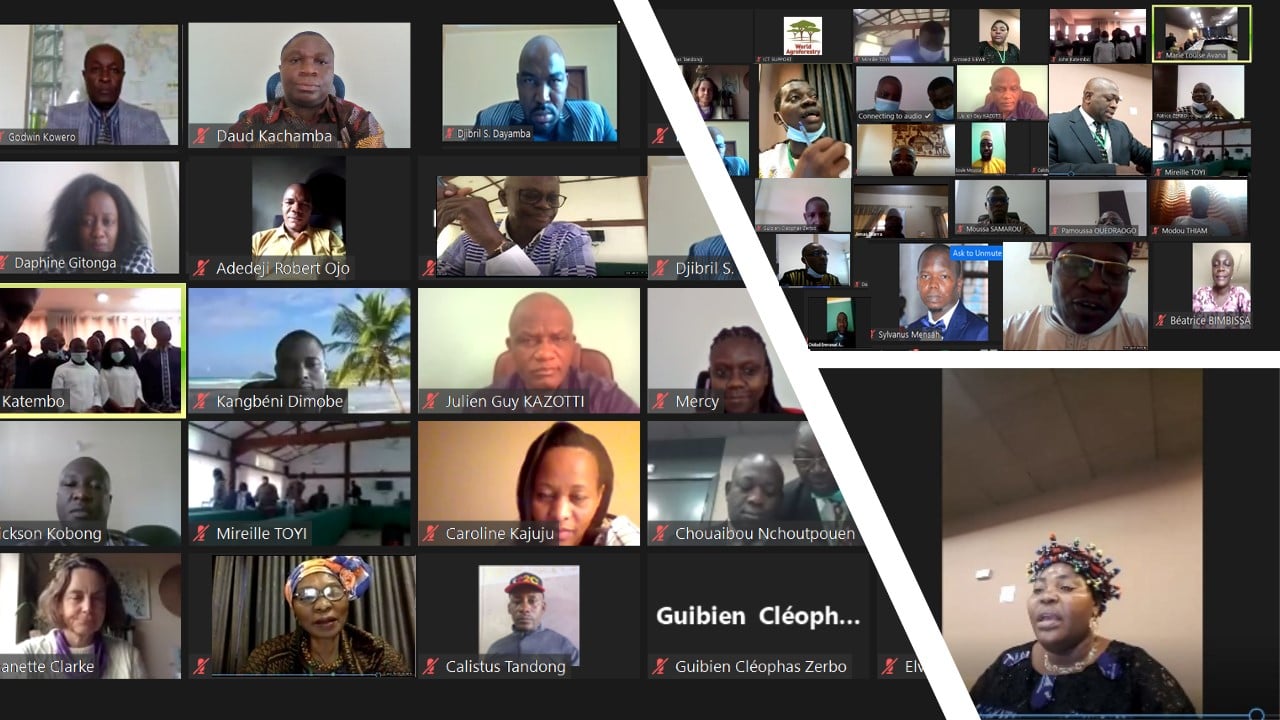Experts Share Valuable Knowledge on Sustainable Forest Management

The African Forest Forum (AFF), in collaboration with the Network for Natural Gums and Resins in Africa (NGARA), organised a webinar on ‘National responses to Paris Agreement and community resilience to climate change’ from 6 to 8 September 2021. This webinar digitally connected four (4) national face-to-face meetings to regional experts, AFF Secretariat and other stakeholders participating remotely.
The webinars aimed to share results obtained by AFF during the last two years from its work on strengthening sustainable management of Africa’s forests and trees outside forests and their role in meeting global and national climate change mitigation goals.
Professor Raphael Tihelwa Chibunda graced the webinar through the speech read on his behalf by Professor Esron D. Karimuribo. He said, “My institution has a keen interest in forestry development in Africa through evidence-based policy development to support efforts towards achieving sustainable development”.
Professor Chibunda, the Vice-Chancellor at the University of Sokoine in Tanzania, congratulated the AFF for their essential contributions to forestry development in Africa through its science-policy-management framework that has been valuable in generating and linking knowledge production and use for enhanced evidence-based decision-making processes on priority issues critical for the development of the forestry on the continent. “ We see ourselves as beneficiaries of this process that AFF is undertaking and look forward to increased collaboration on this and other issues”, said Prof. Chibunda.
He reminded the participants how several global environmental issues have emerged in the past decades that have a significant bearing on forestry in Africa, including climate change, green economy, land degradation, and sustainable development goals. He urged the participants that these challenges call for building appropriate capacities to address them in line with international best practices. Prof. Chibunda advised governments, public organisations, communities, and the private sector on having an improved understanding of such issues to inform appropriate action. He was also grateful that AFF has been at the forefront in strengthening such understanding through its network of African experts who conduct an independent and objective analysis of the critical issues.
During his welcoming remarks, Prof Godwin Kowero, the Executive Director for the African Forest Forum, welcomed the participants and informed them that the African Forest Forum has for many years collaborated with institutions and individuals from various countries; working on some common issues that are related to trees and forests and on the way they can be used wisely to support lives and generate income.
During the webinar, the Executive Director for the Centre for Coordination and Agricultural Research in Southern Africa(CCARDESA) shared findings of a study conducted in Eswatini, Botswana, Zambia, South Africa from the SADC region and Kenya, Tanzania, Ethiopia, Uganda from the EAC region. The objective of the study was to assess the responsiveness of African national forest governance to the Paris Agreement (PA), related global climate change policies and initiatives and to assess National Forest Sector (NFS) contributions to Nationally Determined Contributions (NDCs) to climate change mitigation and adaptation. The findings revealed that while many African governments have signed, ratified or acceded to forest and climate change-related international agreements, their compliance to the provisions of the agreements has been limited. Dr Dlamini revealed that despite 148 countries having ratified the Paris Agreement and 142 having submitted their first NDCs, only a few African countries had taken steps to comply with the agreements. Moreover, the integration of the provisions of the agreements into national policies, plans and activities has not been systematic, and the approaches for doing so have been uncoordinated. Consequently, most African governments are yet to fulfil most of their international obligations on forestry and have not realised the benefits thereof.
Dr Dlamini also indicated that forests have the potential for climate change mitigation and carbon sequestration. He also pointed out that for countries to fully understand sustainable forestry Management (SFM), they urgently need to align their national policies and legislative framework to regional and international agreements.
The findings also revealed a lack of stakeholders’ understanding of forest and climate change instruments. It was also discovered that SADC and EAC regions face institutional, technical and financial capacity gaps and needs concerning implementing the adaptation and mitigation components. Furthermore, Land Use, Land-Use Change and Forestry (LULUCF), and Reducing emissions from deforestation and forest degradation (REDD+) are not included in the NDCs.
Dr Dlamini recommended, among other things, that countries should undertake multi-stakeholder training on effective mainstreaming approaches of the global forest and climate change policies and initiatives and align NDC actions with new national policy priorities.
The meeting attracted over 200 participants from across Africa. The African Forest Forum (AFF) is a pan-African non-governmental organisation headquartered in Nairobi, Kenya. It is an association of individuals who share the quest and commitment to the sustainable management, use, and conservation of Africa’s forest and tree resources for the socio-economic well-being of its people and the stability and improvement of its environment.
The purpose of AFF is to provide a platform and create an enabling environment for independent and objective analysis, advocacy and advice on relevant policy and technical issues pertaining to achieving sustainable management, use and conservation of Africa’s forest and tree resources as part of efforts to reduce poverty, promote gender equality, and economic and social development. Through all its programmes and activities, AFF seeks to promote the empowerment of all marginalised groups, particularly women who continue to be vulnerable to the impacts of climate change and whose representation, priorities and needs are rarely adequately addressed in the forestry sector.

























































